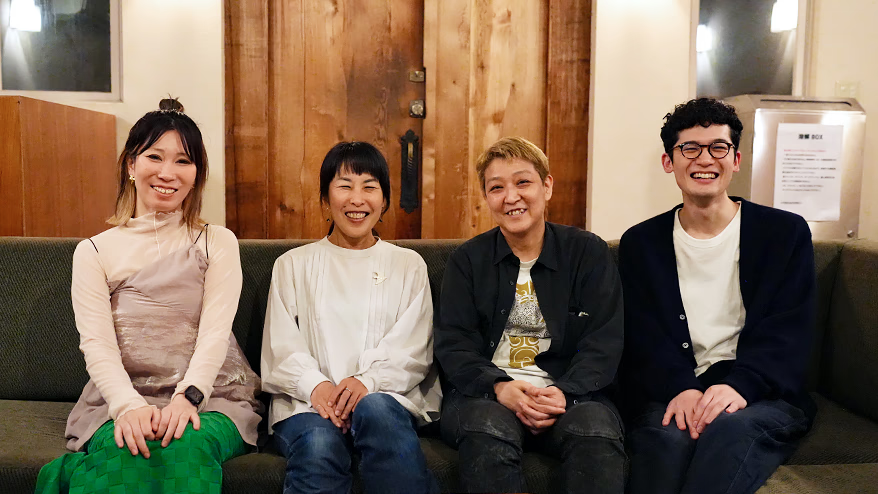モノサスとつながる方々それぞれの「モノサシ」をインタビューしている「めぐるモノサシ」。今回登場してくださったのは、ライターの杉本恭子さんです。
現在、杉本さんにはものさすサイトの運用に携わっていただいており、「自由と責任 〜みんなの制度と働き方実験室〜」や「キン担ラボ」、「あんな人 こんな人 つくる人」などのコーナーの記事をインタビュー・ご執筆いただいております。
そんな杉本さんに、モノサスのメンバーから「お話を聞いてみたい」という声があがり、ごはんを囲んで、ゆるやかな座談会を行いました。今回はその様子をお届けしたいと思います。
(インタビューした人:児嶋(ディレクター)・久野(プランナー)・滝田(デザイナー)、ものさすサイト事務局のきみさん)
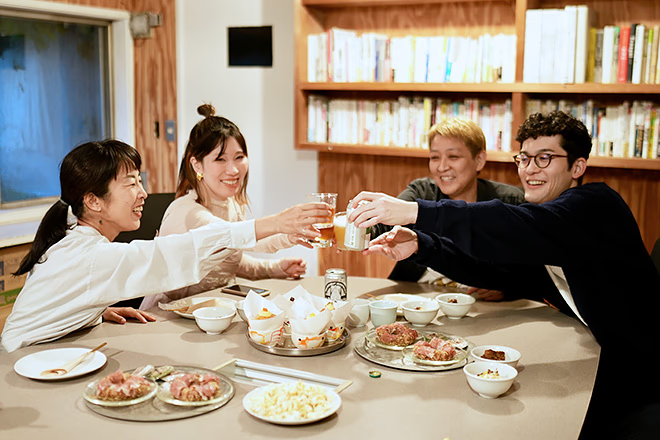
ゆるやかな座談会、まずは乾杯からスタートしました
杉本恭子さんプロフィール:
大阪生、京都在住のライター。同志社大学大学院文学研究科新聞学専攻修了。自治的な場に関心をもち、寺院、NPO法人、中山間地域でのまちづくりを担う人たちなどのインタビュー・取材を行っている。 著書に『京大的文化事典ー自由とカオスの生態系』(フィルムアート社)がある。
杉本さんとライターの仕事
児嶋:ずっと会社に関わってもらっていて、すごくお話を聞いてみたかったんです。ライターさんだということはわかってるけど、ふだんどんなお仕事をされているのかとか、なぜライターになったのかとか伺ってみたいなと思っていまして。
杉本さん(以下、杉本):小さい頃から文章を書くことが好きだったというのはひとつあったと思います。でも、学生時代には「書くことが仕事になる」とは思えていなくて。今みたいにネットメディアもなかったですし、ブログで発信することが仕事になっていくっていうモデルもなかったし。
地元は大阪で、大学、大学院と京都で過ごして。もうちょっと京都にいたいという安直な理由で地元の企業に就職しました。けど、ぜんぜん仕事が楽しくなくて。
そこにいたデザイナーさんが辞めるときに、送別会をしたんですね。ほとんど喋ったことなかったのに、そのときはすごい話しかけてくれて、「杉本さん、他の人たちと毛色違うよね」みたいな。「何がしたいの?」って。
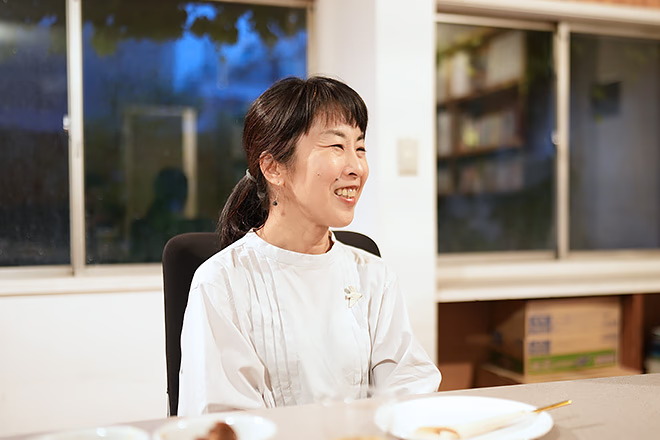
児嶋:なんか、いいですね。
杉本:なぜかその人に素直に「書くことが仕事になればいいと思ってるけど、全然わかんない」みたいに話したんですよ、私。そしたら「何もしていなくても、やりたいと思い続けているだけでもいい。いつかやれるようになるよ」って言われました。その言葉をお守りのようにもちつづけていて。ちょっとずつ書く仕事に近づいていきました。
仕事の中に「書く」がはいってきたのは、ネットコミュニティサービスを運営する会社で、ユーザー向けコンテンツをつくる仕事をしていたときです。メールマガジンやユーザーを巻き込んだ企画を立てて記事をつくっていました。その後、家庭の事情で実家に戻ったときに外資系企業に転職をして、なんちゃってOLをした時期もありました。でも、「なんか違うぞ、ちょっと人生見つめ直そうかな」と会社を辞めたときに、「暇なんだったらやって」って声をかけられたのが雑誌のお仕事。じゃあやってみようかなとライターになったのが15年くらい前ですかね。
児嶋:ということは、いきなりフリーランスってことですよね。不安じゃなかったですか?
杉本:いろいろ不安でしたよ。たとえば、以前の仕事ではユーザーさんに向けて、「仲間が頑張ってシステム障害の復旧やってることをわかってほしい」とか「こんな新しいサービスがつくったからみんなに使ってほしい」とか、すごい自分の気持ちをのせて書けていたんですよね。だけど、当時やっていた雑誌のお仕事では、編集者さんの立てた仮説に基づいて取材も執筆も進めなければいけなくて。取材で「あれ、仮説とは違うな?」と思うことがあっても、自由に書かせてもらえない。それがだんだん苦しくなっちゃって。
久野:言葉にする時に、自分が納得感を持てるかどうかは大事ですよね。
杉本:はい。「美味しい」って書くにしても、誰かが美味しいって決めたものを、私が美味しいと書くのは変だなという気持ちがあって。
たとえば、「京都の調味料」というお題で記事を書くお仕事をいただいたとき、お味噌、お醤油、お酢と胡麻のお店を取材しました。見開き4ページくらいの記事だったけど、お味噌とお醤油、お酢と胡麻を使って、一週間えんえんと料理してから書きました。
そういうことをちゃんとやりたいんですよ。ちゃんと体に入れてから言葉にしたい。聞いた話でちゃっちゃっと書きたいわけじゃないというか。そういう気持ちは年々強くなっているので、儲からないタイプのライターですね(笑)。
滝田:わからないことを書かなきゃいけないことに悩んでいた時期から、今の杉本さんのスタイルに変わっていくのに、なにかきっかけはあったんですか?
杉本:ライターになって1年後に、「自分が書きたいことを書く」としたらなんだろうって考えて。人のインタビューをちゃんとやりたいなと思ったんです。「誰に聞くのがおもしろいのか」と考えた結果、お坊さんのインタビューをはじめました。
児嶋:へー、おもしろい。
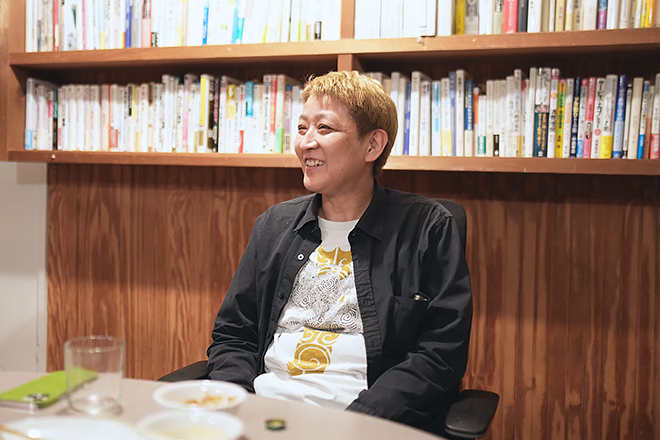
杉本:「坊主めくり」っていうタイトルで、5年くらいお坊さんにインタビューをていました。ところが、「何で出家したんですか」と聞くと、すごい重たい話を聞くこともあるんですよ。
「そんな大事な話を聞くのは私で良かったんだっけ?」って、聞いてる自分が不安になって。そんなときに、西村佳哲さんの「インタビューの教室」を見つけて参加しました。西村さんとのご縁はその後も続いていて、「神山で移り住んだ女性たちにインタビューをしてほしい」と言われて、2016年から5年間『かみやまの娘たち』という連載をしていました。真鍋さんと知り合ったのも、『かみやまの娘たち』がきっかけです。
ものさすとのつながり
児嶋:とは言え杉本さんは、インタビューでたくさんの人に出会っていますよね。そのなかで、なぜモノサスとつながっていったんですか?
杉本:うーん、そうだな。面白かったんでしょうね。真鍋さんと初めてゆっくり話したときに強く印象に残ったのは、「すごいフェアな人だな」ってことだったんですよ。私たちのことを“外注さん”みたいに扱うことはないし、ひとりの人としてお互いにとって良い関係でいようとしてくれる。できるだけどの人に対してもそうありたいと思ってるんだろうなと感じました。
それは、林さんや永井さんにも感じています。それに、モノサスのみなさんと接したときに「あ、人間がいっぱいいる」って思ったんですよね。。「会社員の殻を被った人」じゃなくて「人間」がいる。会社ってこんなコミュニティになれるんだなっていうのが率直な感想で、そこにすごい興味を感じています。
児嶋:たしかにうちの会社って”ともはた”※ですね。
(※「ともに生きていきたい人たちと、働く。」の略語。モノサスが大切にしていることの一つ)
杉本:属人的であってはいけないっていう世の中の感じもあるけど、私は「児嶋さんと一緒に仕事をしたい」って思って関われているほうがいいやんって思うし。そういう世界がここにはあるっていうのが、私にとっては希望ではあるし、いいなって思っています。
児嶋:なんか、じーんときちゃった。
杉本:ものさすサイトに関わらせてもらっているもう一つの理由は、過去に経験したオウンドメディアのお仕事に不完全燃焼感があったからかも。クライアントさんに「いい感じのメディアをつくってね!」と全部お任せされてしまい、「あれ?このメディアをオウンしてるのどっちですか?」って思うことがあったんですよ。
ものさすサイトは、これだけ会社の中に入れてもらって、みなさんに関わらせてもらって、一緒につくることができる。とはいえ、モノサスのメンバーはそれぞれ案件抱えてるから、ものさすサイトのことばかりもできない。そのギリギリの線を一緒に探っていく難しさにも面白さがあるなと思っています。
私にとってものさすサイトは、モノサスという地域のローカルメディアを作っている感覚もあります。ローカルメディアとして、どうやってこのコミュニティをいい感じに耕せるかという気持ちで関わっていて。それは、ライターというよりも、編集者的な興味なのかもしれません。
死ぬまでにやりたいこと
久野:昨年末、杉本さんから「私、死ぬまでにやりたいことがあるんです」という話を聞いたんですけど、そこまで思えるものがあるって、すごいなって思って。
杉本:そのとき何を思い詰めていたのかという気もしますが(笑)。たぶん本だと思うんです。 『かみやまの娘たち』を書籍にしようとしているんですけど、それはたしかに死ぬまでにやりたいですね。
生きてるうちにあと何冊本を書けるかわからないですけど、本を書くのは一本の記事を書くのとは全然違っていて。たとえば、ものさすサイトの記事を書くのは、その人と過ごした時間のスナップショットみたいな感覚なんですよ。本の原稿は白いキャンバスから描きはじめる感じというか。原稿自体とても長いし、すごく時間をかけられる。「これってどういうこと?」と問いを立てて、好きなだけ探究できるというか、それがすごく苦しくて面白くてて。
『かみやまの娘たち』では、何十人もの大事な人たちに聞かせてもらった、大事な話を預かっています。どうやってかたちにして返して、共有するのかをちゃんとやりたいと思っていたんだと思います。
きみ:最初は頼まれて、神山に通いはじめたんですよね?それがなんのタイミングで自分が死ぬまでにやりたいことになったんですか?
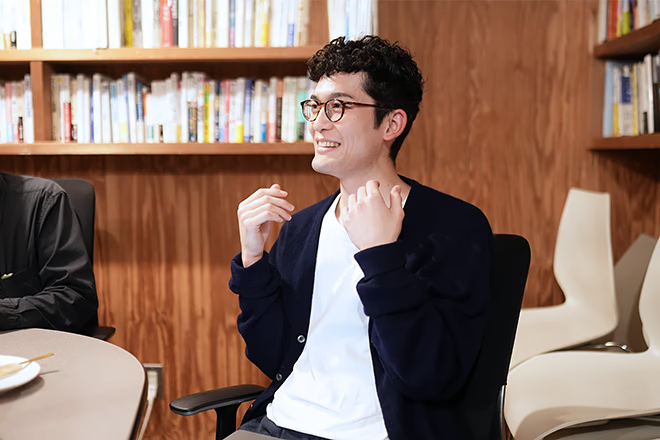
杉本:そうなんですよ。最初は西村さんに頼まれた仕事でした。3ヶ月に一回、山の中に行くのいいかもっていう軽い気持ちですよね。西村さんに信頼して任せてもらえて、嬉しかったというのもありました。
通いはじめた頃は、「このまちに住みたい」なんて気持ちはなかった。でも、3年目くらいかな。「帰ってきた」っていう気分になったんです。みんなも優しいから「おかえり」とか、帰る時に「行ってらっしゃい」と言ってくれますし。
今は行くとすごくホッとします。それって関係性じゃないですか。そんな風に私が感じられるように、分け隔てなく関わってくれる人たちがいて。久野さんも神山で過ごしていて、そういうことを感じることってありませんでしたか。
久野:僕の場合は暮らして3年目にしてようやく、神山の人たちと深く関わることが増えたんです。その頃から、神山が自分の居場所だと感じるようになりました。単純にうれしかったですね。
杉本:インタビューに応えてくれた人たちにとって「いいよ」って思ってもらえる形で書きたいし。神山の町に対しては、100年後にも読んでもらって「100年前、こういうことを考えて神山で生きた女性たちがいたんだね」って思ってもらえるような本になりたい。
私と同じように都会で暮らしていて、神山のような場を持たない人たちには、「こういう生き方もあるんだな」って思いはじめてもらえるといいなとか。私の中にいろんな思いが渦巻いていて。久野さんと話したときは、まだどうしたらできるかわからなくて、ちょっと思い詰めていたのかもしれません。
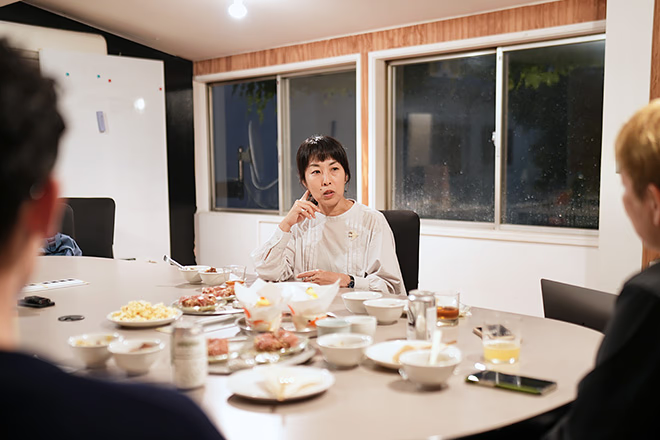
滝田:死ぬまでにやりたいことが本を書くことということは、生涯書く仕事は続けられたいということですか?
杉本:はい。
滝田:それは、書くことを仕事にしたいというところからお話を伺ってきましたが、どこからそう思えたんですか?
杉本:うーん。明確にいつとはわからないけど、結果的に飽きなかったです。書く仕事に関しては、一切。
フリーになる前にお勤めしていた外資系企業は、とっても良い会社でした。お給料も良かったし、休みもたくさんあって、福祉面も充実していて、海外出張もいっぱい行っていて。同僚にも恵まれていました。でも、わけのわからない焦りを感じていて。なんかどんどん自分の能力が退化していくって思ってたんですよ。毎日、ちゃんと仕事してたのに。
「できるかどうかわからへん」って思いながら必死になる仕事、成長痛が全然なくて。できることだけをやって、人生を過ごしていっていいのかなって焦燥感に駆られて辞めたんですね。
フリーのライターになったとき、初年度なんて年収は会社員時代の半分以下になったけど、焦燥感はなくなりました。お金が稼げることよりも、いわゆる将来的な生活の安定よりも、「うわ、これできないかも!」って思いながら必死になってやってる方が、私にはよかったんです。もっとうまく書けるようになりたいし、インタビューもまだまだだなと思うし、もっといろんなことを深く知りたいし。どんどんそうなっていくから、ライターの仕事は私に合っていたんだと思います。
いつまで経っても「まだまだやな!」って思えるのがいいんじゃないですか。
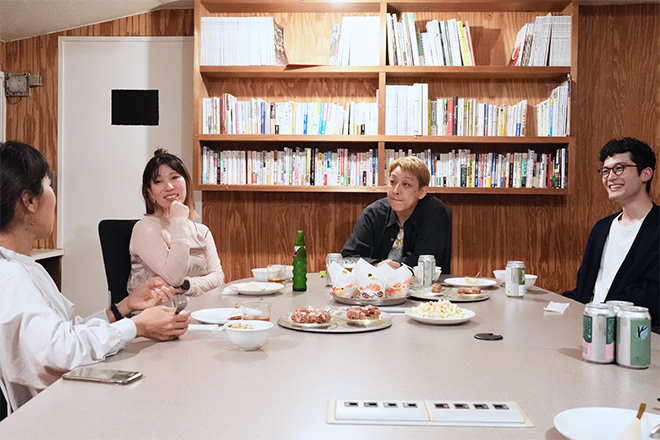
今回、杉本さんがライターになるまでのお話や、モノサスとの繋がりについて、また人生を通してやりたいことなど、とても深いお話までお聞きすることができました。
書くことへの想いを語る杉本さんの笑顔が本当にキラキラしていて綺麗で、すごく印象に残っています。
わたしたちの質問に、一つ一つ丁寧に経験を振り返りながらお話してくださった杉本さんに、一同興味がつきず、時間ぎりぎりまで語らいは続きました。
もうひとつ、紹介しておきたい、杉本さんからのアドバイス
話をしている中で、児嶋から「記事を書きたい気持ちがあるが、どうにも作業が進まない」という悩みを打ち明けるシーンがありました。杉本さんが丁寧にアドバイスをしてくださったので、最後にご紹介します。悩んでいるみなさま、ぜひ試してみてください。
杉本:どうやって書いていいかわからないときは、書いてみるしかない。ある程度書いてみると何を書きたいのかわかりますよ。たぶん、ファイル開くのが一番大変なんです。まずは、アプリを立ち上げる→ファイル名付ける。ここまでいったら半分ぐらいですよ!
1行書いたら、とりあえず進むので。例えば「○○作りしてきました」っていう1行までなら書けるでしょう。そしたら、必ず次の1行も出てくると思います。
